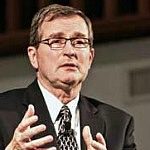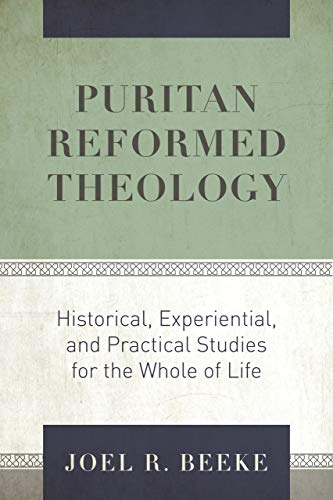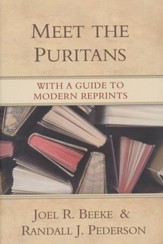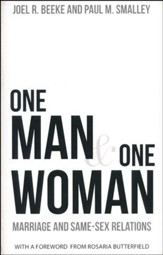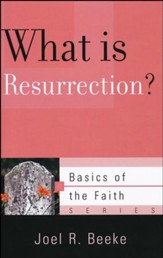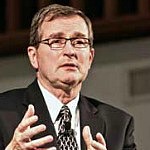
Quotes by Joel Beeke
The primary ground of assurance is rooted in the promises of God, but those promises must become increasingly real to the believer through the subjective evidences of grace and the internal witness of the Holy Spirit.
The objective is the food for the subjective; thus the subjective is always rooted in the objective… Without the Spirit’s application, the promises of God lead to self-deceit and carnal presumption. On the other hand, without the promises of God and the illumination of the Spirit, self-examination tends to introspection, bondage, and legalism. Objective and subjective Christianity must not be separated from each other.
When Charles Spurgeon was asked how these two grand, biblical doctrines could be reconciled, he responded as a real heir of the Puritans: “I didn’t know that friends needed reconciliation.” He went on to compare these two doctrines to the rails of a track upon which Christianity runs. Just as the rails of a train, which run parallel to each other, appear to merge in the distance, so the doctrines of God’s sovereignty and man’s responsibility, which seem separate from each other in this life, will merge in eternity. The Puritans would wholeheartedly concur. Our task, they said, is not to force their merging in this life but to keep them in balance and to live accordingly. We must thus strive for experiential Christianity that does justice both to God’s sovereignty and to our responsibility.
Read as an act of worship. Read to be elevated into the great truths of God so that you may worship the Trinity in Spirit and in truth. Be selective about what you read, however. Measure all your reading against the touchstone of Scripture. So much of today’s Christian literature is froth, riddled with Arminian theology or secular thinking. Time is too precious to waste on nonsense. Read more for eternity than time, more for spiritual growth than professional advancement.
Let every preacher take note: Amid the frustrations and hardships of ministry, the most Christ-like thing is to stay focused on your calling, give thanks to God, and go on preaching the Gospel.
Pride is a devastating sin and is complex. Most sins turn us away from God, but pride directly attacks God. It lifts us above and against God, seeking to dethrone Him by enthroning ourselves.
A Just War, Tabletalk, October 2008, p. 37. Used by Permission of Ligonier Ministries.
The sacraments are visible means through which we and Christ commune. They encourage us to be like Christ in all His holiness. The grace received through the sacraments is no different from that received through the Word. Both convey the same Christ.
Do you talk to others about our depraved nature and our desperate need for salvation in Jesus Christ? Do you say that you are no better than they are by nature; that we are all, apart from grace, sinners with a terrible record, which is a legal problem, as well as a bad heart, which is a moral problem? Do you talk to them about the dreadful character of sin; that sin is something that stems back to our tragic fall in Adam and affects every part of us, so dominating our mind, heart, will, and conscience that we are slaves to it? Do you describe sin as moral rebellion against God? Do you say that the wages of sin is death, now and for all eternity?
Prayer helps us cling to the altar of God’s promises by which we lay hold of God Himself.
Association promotes assimilation. A Christian who lives in isolation from other believers will fail to receive the blessings as well as the maturity resulting from godly interaction.
Assurance of Faith: Calvin, English Puritanism, and the Dutch Second Reformation, Peter Lang, 1991, p. 407-408.
Before picking up a book, ask yourself: Would Christ approve of this book? Will it increase my love for the Word of God, help me to conquer sin, offer abiding wisdom, and prepare me for the life to come? Or could I better spend time reading another book?
The Greek word…Kurios can mean the teacher who has authority over disciples, the master who has command over servants, or the lord who has power over all. With Jesus, all three meanings apply.
One of our greatest rewards as Christians is to serve people. If the result is watching them draw closer to Christ through the Spirit’s blessing upon God’s Word and our efforts, what more could we possibly ask for?
Disciplined meditation on Scripture helps us focus on God. Meditation helps us view worship as a discipline. It involves our mind and understanding as well as our heart and affections. It works Scripture through the texture of the soul. Meditation helps prevent vain and sinful thoughts (Matthew 12:35) and provides inner resources on which to draw (Psalm 77:10-12), including direction for daily life (Proverbs 6:21-22). Meditation fights temptation (Psalm 119:11, 15), provides relief in afflictions (Isaiah 49:15-17), benefits others (Psalm 145:7), and glorifies God (Psalm 49:3).
The way to godly living is surprisingly simple: We are to walk with God in His appointed way (Micah 6:8), diligently using the means of grace and the spiritual disciplines, and waiting upon the Holy Spirit for blessing. Note that godly living involves both discipline and grace. This emphasis upon duty and grace is fundamental to Reformed, experiential thinking on godly living.
Head knowledge is not evil in and of itself. Most of our Reformed and Puritan forefathers were highly educated. The Reformers never tired of stressing the value of Christian education. But this education must be empowered by the Holy Spirit and applied to the heart. Head knowledge is insufficient without the Spirit’s application to the inward man.
Just as the rails of a train (track), which run parallel to each other, appear to merge in the distance, so the doctrines of God’s sovereignty and man’s responsibility, which seem separate from each other in this life will merge in eternity. Our task is not to force their merging in this life but to keep them in balance and to live accordingly.
The primary ground of assurance is rooted in the promises of God, but those promises must become increasingly real to the believer through the subjective evidences of grace and the internal witness of the Holy Spirit.
Exposition alone is not preaching. A minister who only presents the grammatical and historical meaning of God’s Word may be lecturing or discoursing, but he isn’t preaching. The Word must also be applied. This application is an essential characteristic of Reformed preaching. Without it, vitality is quenched.
